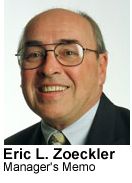 |
Published April 2005
‘High
performer’
is not same as ‘workaholic’
 Q.
One of my annual goals as a manager is to significantly raise production
of my department. The strategy of urging employees to “work harder, longer
and with more intensity” is initially appealing but could lead to burnout
and turnover issues if taken to the extreme. The company is against offering
performance bonuses within a single department. What other alternatives
should I consider?
Q.
One of my annual goals as a manager is to significantly raise production
of my department. The strategy of urging employees to “work harder, longer
and with more intensity” is initially appealing but could lead to burnout
and turnover issues if taken to the extreme. The company is against offering
performance bonuses within a single department. What other alternatives
should I consider?
A. Just about everybody is feeling pressure to improve. “Making your numbers” is a manager’s “job one.” Today, there are no excuses for failure.
That said, it’s time to take a deep breath and relax. First, congratulate yourself for having the instinct that pressing your staff into increasing production could, in the long term, be counter productive.
People who work with high intensity and long hours usually do so voluntarily, unless they work in an environment that expects such “dedication” from everybody. I am not aware of any research that indicates that people who work in a state of frenzied chaos achieve more than those who are more laid back.
In fact, a joint research study at the University of Michigan and University of Toledo found it’s more likely that people who work most efficiently and who resolutely focus on achieving high success emerge as the most productive and consistently successful.
Jack Simonetti, professor of executive education at Michigan, and Clinton O. Longenecker, professor of management at Toledo, found several common threads in how high achievers approach building their long-term success records.
“Mention ‘high achiever’ and ‘results-oriented individuals,’ and a common word picture of these people often emerges — ‘Darth Vader,’ ‘stern task master,’ ‘incredibly focused workaholic,’” said Longenecker.
The two researchers found the exact opposite — that high achievers tend to be humble, good-natured individuals who demonstrate a highly balanced concern for tasks and systems as well as an abiding concern for people and their individual development, he said.
Their book “Getting Results” (Jossey-Bass, San Francisco, 2002), based on surveys of more than 2,000 managers and professionals in 400 organizations, lists five essential core behaviors of high performers:
- Focus on your organization’s mission. Create and maintain a clear and unambiguous focus on the desired results of yourself, your people and your operation, and create a method to measure performance.
- Equip your operation with the best tools, talent and technology. Take great care in hiring top-quality people for jobs that are right for them. Provide ongoing training and education dedicated toward teaching the necessary skills and talents necessary to get results. Provide the best tools to get the job done.
- Create a productive environment. Build an operational climate that encourages and rewards measured performance. Continually monitor performance at all levels, and regularly and rapidly remove barriers that block performance achievement.
- Nurture relationships. Build, nurture and sustain effective, 360-degree working relationships with people you depend on to get things done. Communicate regularly and creatively with them.
- Renew yourself regularly, avoid burnout. Continuously improve and renew yourself, your processes and your people through training, education and reading. Maintain balance in all facets of your life, including your personal interests. Consider any time spent working over 50 hours a week a waste.
Eric Zoeckler operates The Scribe, a business writing service. He also writes a weekly workplace column appearing Mondays in The Herald. He can be reached at 206-284-9566 or by e-mail to mrscribe@aol.com.
The
Marketplace
Heraldnet
The
Enterprise
Traffic
Update
Government/Biz Groups
© 2005 The Daily Herald Co., Everett, WA
